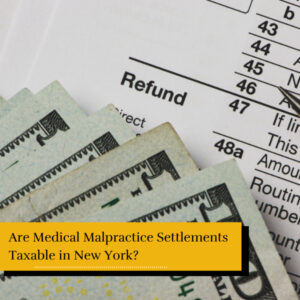
If you have been injured due to negligence on the part of a physician, surgeon, nurse, anesthesiologist, or another medical professional, you have a legal right to bring a malpractice claim against the provider or facility. Through a medical malpractice claim you could potentially obtain compensation for financial and non-financial damages you suffered.
To prove medical malpractice, you must be able to show that your physician or another medical provider failed to adhere to an acceptable standard of care. If your case is successful and you receive a medical malpractice settlement, either during the claims process or after litigating your case, you might be wondering if your settlement is taxable. The answer is slightly complicated, so our medical malpractice attorneys have created a guide to taxable and non-taxable damages below.
Medical malpractice settlements are generally not taxable when it comes to compensation for physical injuries and financial damages. However, there are a few specific elements of a medical malpractice settlement that are taxable, and it’s important to understand what those elements are so that you aren’t surprised later on.
If you are a victim of medical malpractice, contact a New York medical malpractice lawyer at Finz & Finz, P.C. today to discuss your case. We are committed to helping clients just like you recover the most non-taxable compensation possible.
Types of Compensation You Can Recover Through a New York Medical Malpractice Claim
There are numerous types of damages you can recover compensation for through a medical malpractice claim or lawsuit. Depending on the specific circumstances of your case, you could seek financial relief for:
- Present and future medical expenses related to your injuries
- Lost wages if you were forced to take time off work during your recovery
- Reduced future income if you are no longer able to perform your current job due to a disability
- Physical and emotional pain and suffering, mental anguish, post-traumatic stress disorder (PTSD), and other non-financial losses
- Lost quality of life
You could also potentially be eligible to recover punitive damages as part of a medical malpractice lawsuit. Courts rarely award punitive damages because the standard of proof is higher than it is for financial and non-financial damages. To seek punitive damages, you must prove that the treating physician or healthcare facility that committed the malpractice acted extremely recklessly, with total disregard for your safety.
What Elements of a Medical Malpractice Settlement Cannot Be Taxed?
Any money that you receive is taxable if state or federal tax law considers it to be “income.” If you were injured and are being compensated through a medical malpractice settlement, that is typically considered to be reimbursement for damages you suffered rather than income you earned, like wages through your job.
Compensation recovered for financial damages is considered to be non-taxable income by state and federal tax policy. Financial relief for any injuries or illnesses a patient suffers due to medical malpractice in New York can’t be taxed. So if you received compensation for medical costs, lost income, reduced future earning potential, and other economic losses related to your physical injuries, you should not have to pay state or federal taxes on that money.
What Elements Can Be Taxed?
Still, there are certain aspects of a settlement that can be legally taxed. For a start, punitive damages are taxable. As mentioned above, punitive damages are rarely awarded by courts due to the high standard of proof that is necessary to acquire them, but if you do receive them, you’ll have to report them when you file your taxes.
Punitive damages are not the same as compensatory damages because, although they are a portion of your total financial reward, the goal of punitive damages is to punish the at-fault party for their excessive recklessness and to deter them from engaging in similar behavior in the future.
A skilled medical malpractice lawyer can help you make sure that your compensatory damages and punitive damages are categorized separately so that you only have to declare the compensation you received for punitive damages on your tax form.
If interest has been paid as part of your settlement, that income is also taxable. While not every settlement includes interest, the judge could order the defendant to pay interest on settlements from the date you originally filed your complaint to the day the judgment or verdict was issued.
Lastly, some non-financial damages can now be taxed thanks to a 2017 federal tax law (Tax Cuts & Jobs Act) passed by the Trump administration. This law, which took effect in 2018, altered the pre-existing determination whether compensation for personal injury settlements could be considered taxable income.
Under the new law, you might have to declare some non-economic losses, but the regulations are vague at best. For example, you might not have to pay taxes on compensation for emotional trauma you suffered after certain severe illnesses or injuries, such as accidental amputation or paralysis. However, you might be required to pay taxes on compensation you receive for emotional trauma that led to an illness. As a result, medical malpractice settlements that were rewarded on the basis of emotional trauma rather than physical injuries could be taxable.
It’s also worth noting that you can no longer deduct legal fees under the new federal tax law. Due to the complications surrounding the law, we highly recommend speaking with a personal injury attorney about how to maximize your compensation and reduce the potential for taxation.
Contact a New York Medical Malpractice Attorney Today
If you were injured due to a medical provider or medical facility’s negligence, contact Finz & Finz, P.C. today. Our New York and Long Island medical malpractice attorneys have the knowledge and resources to investigate the alleged malpractice, document your losses, and negotiate a fair settlement on your behalf, with the goal of minimizing taxable damages and maximizing your financial reward.
There is a 2.5-year statute of limitations on most medical malpractice cases in New York. It takes time for an attorney to gather additional evidence and build a case on your behalf. If settlement talks fall through, you want to ensure that there is still time to take legal action, so contact Finz & Finz, P.C. today for a free case evaluation.





























